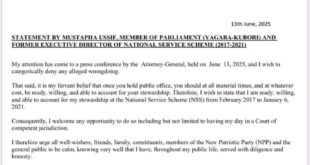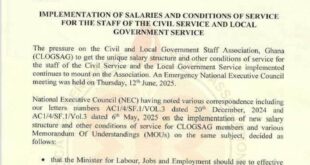The Ghana National Association of Authors and Publishers (GNAAP) is instituting a new price increment for books and stationery for schools.
The increment which took effect on 8th November 2022 will affect bookshops, basic schools, Junior and pre-tertiary institutions.
GNAAP named the current exchange rates, inflation, payment terms, and interest rates as factors accounting for the increment.
High fuel prices, utilities and discounts given to schools are also noted reasons for hikes.
The GNAAP president, John Akwasi Amponsah, was speaking at the press conference on challenges facing the book industry in recent times.
He mentioned that the dollar to cedis rate has increased importation of stationary materials.
“The exchange rate of the cedi to the dollar has risen from 5.80 to 15cedis and still continues to rise. What this means is that importers of paper and finished products and printing inputs will need more cedis to run a smooth business.
“For example, goods that we needed 62,000 dollars to produce last year alone compared with this year are double the amount that we used. So in effect per the exchange rate, we need a capital investment of the same amount that we invested last year.
“The effect will be that the availability of books will not be forthcoming and secondly if the books are there, parents and schools should expect high prices,” he said.
Mr. Amponsah again stated that port duties have increased twice the previous year.
“Now to offset, last year to offset a 120 feet container required about 40,000 Ghana cedis. This very year that same consignment requires 82,000 to1.2 old currency billion cedis to get the materials needed for the books” he said
The hikes in fuel and diesel prices, according to Mr. Amponsah, are noted to have added to transportation expenses.
“From the beginning of this year till now, fuel price stands at 71%. This affects the transportation of goods to our own respective warehouses. Besides, we spend huge sums of money on transport as we made the effort to send samples of our books to schools.
“It’s not only the government that patronizes the selection and buying of our books. All private schools in Ghana buy books from us but before they get the books, we have to patrol the whole of Ghana individually as Publishers to give samples of our books to them for them to review and get back to us. In the process we do have a huge budget on transport,” he said.
Mr. Amponsah added that most clients which include both private and public have over the years been given a credit facility that extended between three to six months.
This credit facility has been reduced from these months to 30 days.
“For this reason, we are compelled to run on cash and carry basis until the country’s economic situation is stabilized,” he stressed.
He suggested a private-public partnership to run a paper mill to ensure availability of papers for textbooks.
Thanks for reading from MyGhanaMedia.com as a news publishing website from Ghana.
Source: My Joy Online

Send your news stories to myghanamedia@gmail.com and Chat with us via WhatsApp on +233 200818719
 MYGHANAMEDIA.COM Best Source Of Latest News
MYGHANAMEDIA.COM Best Source Of Latest News




